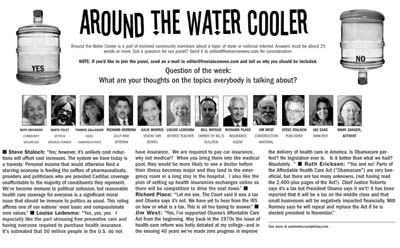Panelists answered the following: Should police use social media to help ID someone who picks up a wallet or other property at a business while referring to the person as a thief?
Ruth Erickson: “They already use social media to ID suspects, but the person should be considered innocent until proven guilty.”
Mary Zanger: “Yes it would be helpful. Keep in mind that social media is also the source of misinformation which must be weighed on the balance of direction and wrong turn.”
Marty Richman: “No, the use of social media is just fine, but we must use care not to prejudice the images. Example, language in the Nixle alert; “Hollister Police Department is asking for the public’s help in identifying this person (pictured)” is preferable to characterizations.
Nants Foley: “Social media is a way of life now. I believe we should use it to make our lives better. That would include law enforcement! When you find something that does not belong to you in a store, you turn it in to the management of that store hoping it will be reclaimed by the rightful owner. You don’t stick it in your hat and scoot out. We all know that.”
Jim West: “Absolutely yes. The police should use every possible tool to recover stolen property – that’s their job. I might have referred to the person caught on camera as a “suspect” rather than a “thief,” but I applaud the police department’s use of technology to recover stolen property. The victim was the one who lost the wallet, not the one caught on camera with the wallet hidden in his hat.”
Richard Place: “I don’t believe we should publish accusations without proper legal procedure. It’s too easy to wrongly accuse someone without doing the proper investigation. You are still innocent until proven guilty. With the use of the public media for background checks you could easily harm an innocent person.”









